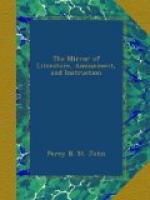and the Nunnery on the right, the T has now something
of the air of the italic capital T, turned up at one
end and down at the other. The latest improvements
are the bow-window in the market-place, commanding
the pavement both ways, which the late brewer, Andrews,
threw out in his snug parlour some twenty years back,
and where he used to sit smoking, with the sash up,
in summer afternoons, enjoying himself, good man;
and the great room, at the Swan, originally built by
the speculative publican, Joseph Allwright, for an
assembly-room. That speculation did not answer.
The assembly, in spite of canvassing and patronage,
and the active exertions of all the young ladies in
the neighbourhood, dwindled away, and died at the
end of two winters: then it became a club-room
for the hunt; but the hunt quarrelled with Joseph’s
cookery: then a market-room for the farmers; but
the farmers (it was in the high-price time) quarrelled
with Joseph’s wine: then it was converted
into the magistrate’s room—the bench;
but the bench and the market went away together, and
there was an end of justicing: then Joseph tried
the novel attraction (to borrow a theatrical phrase)
of a billiard-table; but, alas! that novelty succeeded
as ill as if it had been theatrical; there were not
customers enough to pay the marker: at last,
it has merged finally in that unconscious receptacle
of pleasure and pain, a post-office; although Hazelby
has so little to do with traffic of any sort—even
the traffic of correspondence—that a saucy
mail-coach will often carry on its small bag, and as
often forget to call for the London bag in return.
In short, Hazelby is an insignificant place;—my
readers will look for it in vain in the map of Dorsetshire;—it
is omitted, poor dear town!—left out by
the map-maker with as little remorse as a dropped
letter!—and it is also an old-fashioned
place. It has not even a cheap shop for female
gear. Every thing in the one store which it boasts,
kept by Martha Deane, linen-draper and haberdasher,
is dear and good, as things were wont to be.
You may actually get there thread made of flax, from
the gouty, uneven, clumsy, shiny fabric, ycleped whited-brown,
to the delicate commodity of Lisle, used for darning
muslin. I think I was never more astonished,
from the mere force of habit, than when, on asking
for thread, I was presented, instead of the pretty
lattice-wound balls, or snowy reels of cotton, with
which that demand is usually answered, with a whole
drawerful of skeins peeping from their blue papers
—such skeins as in my youth a thrifty maiden
would draw into the nicely-stitched compartments of
that silken repository, a housewife, or fold into
a congeries of graduated thread-papers, “fine
by degrees, and beautifully less.” The
very literature of Hazelby is doled out at the pastry
cook’s, in a little one-windowed shop kept by
Matthew Wise. Tarts occupy one end of the counter,
and reviews the other; whilst the shelves are parcelled
out between books, and dolls, and ginger, bread.
It is a question, by which of his trades poor Matthew
gains least; he is so shabby, so threadbare, and so
starved.




